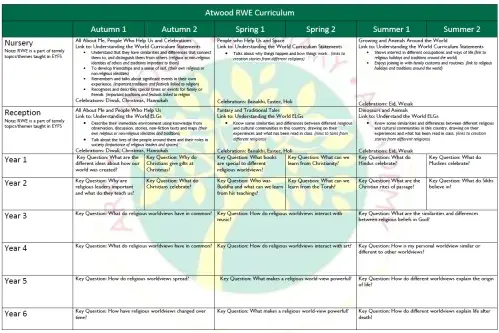Why do we learn Religious Education?
We believe that a strong Religion and Worldviews education provokes challenging questions about meaning and purpose in life, beliefs about God, ultimate reality, issues of right and wrong and what it means to be human.
Our approach
The Religious Education curriculum at Atwood aims to enable each pupil to understand, reflect upon and develop their own personal worldview. We aim to encourage children’s curiosity about the world and develop their critical thinking skills by using the key concept of worldviews. Worldviews are different ways of understanding the world. By exploring how worldviews are formed, change over time and are expressed at both individual and communal levels, pupils will reflect upon and refine their own worldview as well as those of others, thus enabling them to appreciate the diversity of thought while independently forming their own.
The curriculum will borrow from the following disciplines and in doing so will intertwine with the PSHE and Humanities curricula at Atwood.
- Theology Pupils will engage with ways in which human beings experience and interact with faith, God and religion. They will explore key ideas, cultural practices, similarities and differences associated with major world religions. They will also explore non-religious worldviews such as Atheism, Secularism and Humanism.
- Philosophy Pupils will explore the ways in which different worldviews, both religious and non-religious, attempt to understand the world, human existence, morality and ethics.
- Sociology Pupils will explore how religious and non-religious worldviews interact with society and identities, create social relationships and impact culture and politics.
Links to the local context are forged through trips to places of religious significance and sharing experiences and perspectives from the parent and local community.
- Image
